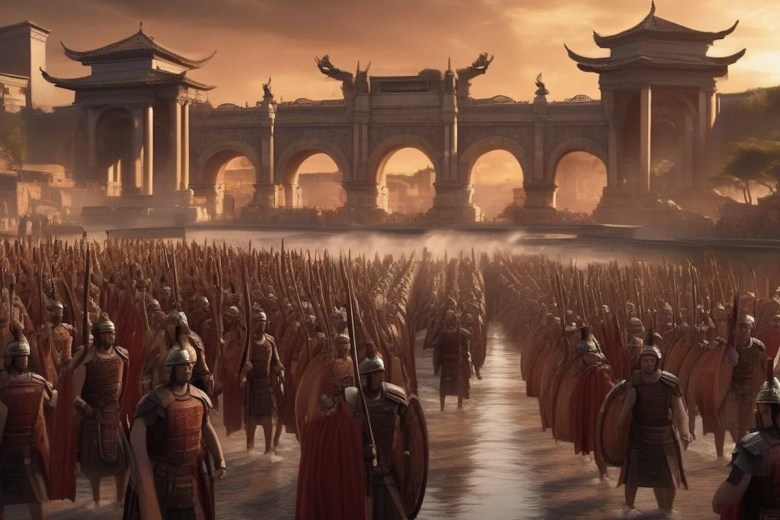Science
Examining the Divergent Histories of Ancient Rome and China

A recent speech titled “First Notes on Geo-Philosophy” delivered by Feng Youlan at the First World History Frontiers Forum in Beijing on September 12, 2025, highlights the contrasting historical trajectories of ancient Rome and China. Organized by the Chinese Academy of Social Sciences and published by the Appia Institute, the discourse emphasizes how geographical environments shaped the development of these two great civilizations.
The Roman Empire emerged around the Mediterranean, building on the foundations laid by the Greeks and Phoenicians, who were adept at sea navigation. Initially, Rome had to wrest control of the Italian peninsula from these maritime peoples, establishing dominance over the Mediterranean. The Roman naval vessels featured rowers organized in parallel lines, each equal in status, working in unison. The effectiveness of this model was crucial; cohesion was essential, as a single mistake could spell disaster for both ship and army.
The Mediterranean itself presented a perilous environment, characterized by unpredictable winds and currents. This unpredictability required Rome to cultivate a flexible approach, adapting to sudden changes rather than adhering strictly to a long-term plan. The political structures of both Sparta and the Roman Republic evolved to correct errors made by previous leaders, which proved vital in their military successes. The Greek League’s victory over the Persian Empire and Alexander’s conquests exemplified the effectiveness of this model.
In stark contrast, the geographical context of ancient China was notably different. The Chinese space was largely enclosed, bordered by steppes to the north, deserts and mountains to the west, and dense jungles to the south. These natural barriers dictated a need for organized groups of people to execute long-term strategies, such as managing river courses and clearing forests. Unlike the unpredictable Mediterranean, the Chinese environment was stable, allowing for planned agricultural expansion.
To meet these challenges, a hierarchical political structure emerged in China, where authority was essential for effective governance. This organization led to a greater concentration of resources and manpower, enabling the construction of extensive irrigation systems and agricultural advancements. The focus on hierarchy in Chinese society diverged significantly from the more egalitarian structures in Rome and Greece.
The philosophical debates in China during the fourth and fifth centuries BCE provide further insight into these differing trajectories. Mozi, a prominent philosopher of the time, criticized the prevailing Confucian doctrines and advocated for a balance of power among states. His ideas emphasized efficient organization and cautioned against the aggression of larger states towards smaller ones, a stark contrast to the militaristic expansionism seen in Greek thought led by figures such as Sunzi.
The differing views on warfare and governance reflected deeper societal values. In Greece and Rome, emperors were often seen as warrior leaders, directly engaging in combat alongside their soldiers. Conversely, Chinese emperors were perceived as semi-religious figures responsible for maintaining social order and stability. This distinction highlights the significant social distance between rulers and subjects in China, where loyalty to the sovereign outweighed notions of rights and duties.
The concept of heroism also diverged sharply between the two civilizations. In Rome, the pursuit of glory through heroic death was celebrated, as exemplified in the Iliad, where the legacy of fallen warriors was immortalized. In contrast, ancient Chinese ideals emphasized the preservation of life, with the notion of yang sheng, or “nourishing life,” guiding individual and state actions.
Despite these differences, both civilizations shared complexities in their social structures and values. The Roman economy thrived on conquest and plunder, while Chinese wealth was primarily generated through agriculture and industry. This fundamental economic divergence influenced their respective approaches to warfare and expansion.
Furthermore, while the Mediterranean experienced a singular unification under Roman rule, the Central Chinese plain has seen a recurring theme of unification across various dynasties, including the Sui and Tang. This unification extended beyond geography to encompass a historical narrative that emphasized continuity, unlike the fragmented historical identities of the Mediterranean states.
Ultimately, the analysis presented by Feng Youlan illustrates that there are no absolute right or wrong paths in history; rather, each civilization has carved out its unique trajectory, shaped by its geographical and historical contexts. The challenge moving forward lies in reconciling these divergent histories to foster a deeper understanding of our shared past. Philosophy serves as a tool to address these historical complexities, allowing for a nuanced examination of the legacies left by both ancient Rome and China.
-

 World5 months ago
World5 months agoSouth Korea’s Foreign Minister Cho Hyun to Visit China This Week
-

 Business5 months ago
Business5 months agoStarling Bank Plans Secondary Share Sale, Targeting $5.4 Billion Valuation
-

 Top Stories5 months ago
Top Stories5 months agoMunsang College Celebrates 100 Years with Grand Ceremony
-

 World5 months ago
World5 months agoPAS Aims to Expand Parliamentary Influence in Upcoming Election
-

 Business7 months ago
Business7 months agoKenvue Dismisses CEO Thibaut Mongon as Strategic Review Advances
-

 Lifestyle6 months ago
Lifestyle6 months agoHumanism Camp Engages 250 Youths in Summer Fest 2025
-

 Sports6 months ago
Sports6 months agoDe Minaur Triumphs at Washington Open After Thrilling Comeback
-

 Sports7 months ago
Sports7 months agoTupou and Daugunu Join First Nations Squad for Lions Clash
-

 Top Stories7 months ago
Top Stories7 months agoColombian Senator Miguel Uribe Shows Signs of Recovery After Attack
-

 World7 months ago
World7 months agoASEAN Gears Up for Historic Joint Meeting of Foreign and Economic Ministers
-

 Health6 months ago
Health6 months agoNew Study Challenges Assumptions About Aging and Inflammation
-

 Business7 months ago
Business7 months agoOil Prices Surge Following New EU Sanctions on Russia









